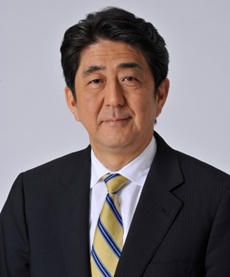Japan PM Abe’s coalition set for big upper house poll win
22 Jul 2013
 Japanese Prime Minister Shinzo Abe's ruling coalition is set for a big win in the upper house election held on Sunday, cementing his grip on power and setting the stage for Japan's first stable government since the charismatic Junichiro Koizumi left office in 2006.
Japanese Prime Minister Shinzo Abe's ruling coalition is set for a big win in the upper house election held on Sunday, cementing his grip on power and setting the stage for Japan's first stable government since the charismatic Junichiro Koizumi left office in 2006.
Exit polls suggest his ruling coalition won at least 76 of the 121 seats contested, broadcaster NHK says.
This would give Abe control of both houses of parliament - a first for a prime minister in six years.
Abe said today his win will help him form a stable cabinet, ending political volatility.
He said the result was an endorsement of his more conservative economic and political reforms.
"We have received overwhelming support from the people for our policies of improving the economy, and solid and stable politics," Abe told reporters after the vote.
The deadlock in parliament has been seen as a key factor in Japan's recent "revolving door" of prime ministers.
The victory would give the hawkish leader a stronger mandate for his recipe to revive the economy and spell his personal political redemption after he led his party to a defeat in a 2007 upper house election.
That poll allowed the opposition to block legislation and led to Abe's resignation two months later.
After a string of revolving-door leaders, Abe, 58, returned to power following a big win in December's lower house poll for his Liberal Democratic Party (LDP) and coalition partner the New Komeito.
Abe has said he will remain focused on fixing the economy with his "Abenomics" mix of hyper-easy monetary policy, fiscal spending and structural reforms.
In foreign policy, Japan's immediate neighbours, most notably South Korea and China, worry that the prime minister may be planning to pursue an aggressively nationalist agenda, encompassing wartime historical revisionism, the abandonment of Article 9 (the so-called "peace clause" of Japan's constitution), and a more belligerent defence of Japan's territorial interests in the East China Sea and the Sea of Japan.
Abe's public rhetoric over contentious wartime issues can at times be insensitive and diplomatically ill-judged, and there is no mistaking the prime minister's personal desire to promote constitutional revision.
However, Japan's public remains largely evenly divided about the merits of re-visiting such contentious subjects and, notwithstanding the LDP's rising political fortunes, the government still lacks the necessary two-thirds majority in the upper house to effect constitutional revision.
Half of the seats in the upper house were being contested in Sunday's election.
Official results are not expected until later on Monday, but exit polls suggest the and its junior partner New Komeito will now control 135 seats in the 242-seat upper house, giving the coalition a comfortable majority.
The main opposition party, the Democratic Party of Japan (DPJ), was expected to win 17 seats, in its worst showing in 15 years, NHK said.
Japan's upper chamber, while not as powerful as the lower house, is able to block legislation introduced by the government. In recent years opposition parties have had enough combined seats to control the chamber, leading to what has become known as a "twisted parliament".
This has resulted in factionalism and multiple changes of prime minister - Japan has had six in the last six years.
The expected results are seen as a major boost to Abe's economic liberalisation policies that have been aimed at a sustainable economic recovery and pulling the country out of deflation. With the public endorsement of his policies, Abe has now got the mandate to continue with his growth initiatives for the next six years.
"We have received overwhelming support from the people for our policies of improving the economy and solid and stable politics," Abe told reporters after Sunday's vote.
He said that the win will help him to form a stable cabinet and he will make sure Japanese people can feel the benefits of economic recovery and political stability.
Abe, who has been in power for the past seven months, has injected trillions of yens into the economy and eased monitory policies to overcome the stagnation and stimulate growth in the world's third largest economy.
The country's gross domestic product (GDP) grew at an annual rate of 3.5 per cent in the first quarter. The inflation has inched up to around -0.3 per cent in May from -0.9 per cent in March. The stock market has risen almost 50 per cent since the LDP coalition came into power in mid-December.
Some observers believe that Abe's win could set off efforts to restart the country's nuclear reactors that were shut down following the Fukushima catastrophe. The ruling coalition is in favour of starting reactors that meet the new safety standards, while the opposition has called for phasing out nuclear power.
Currently, of the 50 nuclear reactors in Japan, only two belonging to Kansai Electric Power Co are in operation.
Neighbours China and South Korea are watching the election results with a mix of optimism and caution.
The outcome set the stage for a stable, long-term rule by Abe and his LDP, China's state-run news agency Xinhua said of the election.
A possible rightward tilt would worry China while South Korea is concerned about a harder stand by the Japanese government on historical events.
Abe's policies that have resulted in significant weakening of the Japanese yen against the US dollar in recent months is weighing on Korean exports due to strengthening of the Korean won.



















